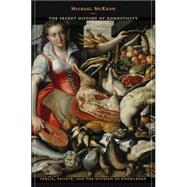
Note: Supplemental materials are not guaranteed with Rental or Used book purchases.
Purchase Benefits
Looking to rent a book? Rent The Secret History of Domesticity [ISBN: 9780801885402] for the semester, quarter, and short term or search our site for other textbooks by McKeon, Michael. Renting a textbook can save you up to 90% from the cost of buying.
Michael McKeon is Board of Governors Professor of Literature at Rutgers University, the author of Politics and Poetry in Restoration England and The Origins of the English Novel, and the editor of Theory of the Novel.
| List of Illustrations | xi | ||||
| Acknowledgments | xv | ||||
| Introduction | xvii | ||||
|
xvii | ||||
|
xix | ||||
|
xx | ||||
|
xxi | ||||
|
xxiii | ||||
| Part One The Age of Separations | |||||
|
3 | ||||
|
3 | ||||
|
5 | ||||
|
7 | ||||
|
11 | ||||
|
16 | ||||
|
18 | ||||
|
24 | ||||
|
26 | ||||
|
33 | ||||
|
39 | ||||
|
43 | ||||
|
49 | ||||
|
49 | ||||
|
55 | ||||
|
56 | ||||
|
60 | ||||
|
64 | ||||
|
67 | ||||
|
70 | ||||
|
76 | ||||
|
83 | ||||
|
88 | ||||
|
95 | ||||
|
99 | ||||
|
106 | ||||
|
108 | ||||
|
110 | ||||
|
112 | ||||
|
120 | ||||
|
122 | ||||
|
134 | ||||
|
143 | ||||
|
147 | ||||
|
156 | ||||
|
162 | ||||
|
170 | ||||
|
177 | ||||
|
181 | ||||
|
194 | ||||
|
205 | ||||
|
212 | ||||
|
212 | ||||
|
219 | ||||
|
225 | ||||
|
228 | ||||
|
232 | ||||
|
242 | ||||
|
252 | ||||
|
259 | ||||
|
269 | ||||
|
272 | ||||
|
277 | ||||
|
285 | ||||
|
294 | ||||
|
301 | ||||
|
303 | ||||
|
312 | ||||
| Part Two Domestication as Form | |||||
|
323 | ||||
|
323 | ||||
|
327 | ||||
|
337 | ||||
|
342 | ||||
|
347 | ||||
|
353 | ||||
|
357 | ||||
|
388 | ||||
|
389 | ||||
|
394 | ||||
|
400 | ||||
|
414 | ||||
|
423 | ||||
|
436 | ||||
|
437 | ||||
|
447 | ||||
| Part Three Secret Histories | |||||
|
469 | ||||
|
469 | ||||
|
473 | ||||
|
482 | ||||
|
486 | ||||
|
487 | ||||
|
491 | ||||
|
492 | ||||
|
494 | ||||
|
499 | ||||
|
503 | ||||
|
506 | ||||
|
507 | ||||
|
513 | ||||
|
517 | ||||
|
519 | ||||
|
524 | ||||
|
530 | ||||
|
536 | ||||
|
540 | ||||
|
547 | ||||
|
549 | ||||
|
557 | ||||
|
565 | ||||
|
569 | ||||
|
588 | ||||
|
588 | ||||
|
589 | ||||
|
598 | ||||
|
615 | ||||
|
621 | ||||
|
623 | ||||
|
627 | ||||
|
631 | ||||
|
639 | ||||
|
660 | ||||
|
660 | ||||
|
672 | ||||
|
680 | ||||
|
692 | ||||
| Notes | 719 | ||||
| Index | 841 |
The New copy of this book will include any supplemental materials advertised. Please check the title of the book to determine if it should include any access cards, study guides, lab manuals, CDs, etc.
The Used, Rental and eBook copies of this book are not guaranteed to include any supplemental materials. Typically, only the book itself is included. This is true even if the title states it includes any access cards, study guides, lab manuals, CDs, etc.